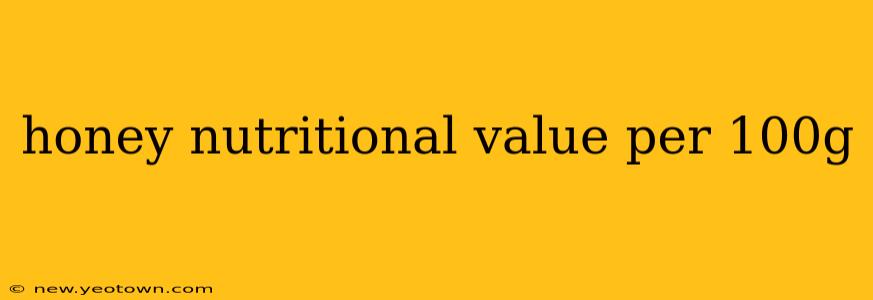Honey, that golden nectar of the bees, has captivated humans for millennia, not just for its delightful sweetness but also for its surprising nutritional value. While often associated simply with sweetness, a closer look reveals a complex profile of vitamins, minerals, and antioxidants. Let's delve into the nutritional powerhouse that is 100g of honey.
Keep in mind that the exact nutritional content of honey can vary depending on several factors, including the floral source, geographical location, and honey processing methods. The values below represent a general average.
The Sweet Facts: Nutritional Breakdown per 100g
A typical 100g serving of honey boasts approximately:
- Calories: 304
- Carbohydrates: 82g (primarily sugars like fructose and glucose)
- Sugars: ~78g (This is where the majority of honey's calories come from)
- Protein: Negligible (less than 1g)
- Fat: Negligible (less than 1g)
While the above figures highlight the carbohydrate-rich nature of honey, it's important not to dismiss its other beneficial components. Honey contains trace amounts of various vitamins and minerals, albeit not in substantial quantities to be considered a primary source for them. These include:
- Vitamins: Small amounts of various B vitamins (like B6 and riboflavin) and vitamin C.
- Minerals: Trace amounts of minerals such as potassium, magnesium, calcium, iron, zinc, and phosphorus.
What About Antioxidants?
Beyond the basic macronutrients and micronutrients, honey possesses potent antioxidant properties. These antioxidants, predominantly polyphenols, help combat oxidative stress within the body. Oxidative stress is linked to several health issues, and therefore, the antioxidant capacity of honey adds to its overall health benefits. The type and concentration of these antioxidants vary depending on the floral source.
Is Honey a Good Source of Vitamins and Minerals?
Does honey contain vitamins and minerals?
Yes, honey does contain trace amounts of various vitamins and minerals, including some B vitamins and minerals like potassium and magnesium. However, it's crucial to remember that these amounts are not significant enough to make honey a primary source for these nutrients. Your daily vitamin and mineral intake should come from a balanced diet of fruits, vegetables, whole grains, and lean proteins.
What are the main vitamins in honey?
Honey contains small amounts of certain B vitamins, like vitamin B6 and riboflavin, as well as trace amounts of vitamin C. Again, these amounts are minimal and should not be relied upon as a primary source for these essential vitamins.
Is honey good for your health?
Honey offers certain potential health benefits, thanks to its antioxidant properties and the presence of trace nutrients. However, due to its high sugar content, it's essential to consume honey in moderation as part of a balanced diet. Excessive honey consumption can lead to weight gain and other health issues associated with high sugar intake.
What are the benefits of eating honey?
Some studies suggest potential benefits of honey, including its use as a natural cough suppressant, improved sleep quality in some individuals, and potential wound-healing properties. However, more research is often needed to confirm these benefits and to establish appropriate dosage and usage guidelines.
Conclusion: Honey – A Delicious Treat in Moderation
Honey's nutritional profile reveals a complex picture. While it is primarily a source of carbohydrates, its antioxidants and trace nutrients contribute to its potential health benefits. Remember, moderation is key. Enjoy the sweet taste of honey, but don't let it overshadow the importance of a balanced diet rich in fruits, vegetables, and other nutrient-dense foods. This will help you maintain a healthy and well-balanced nutritional intake.

